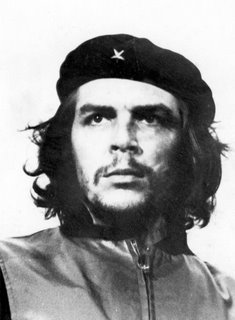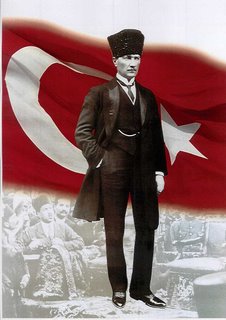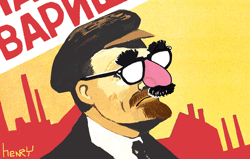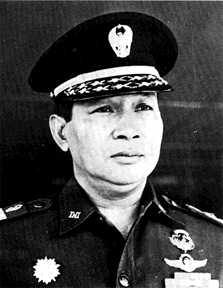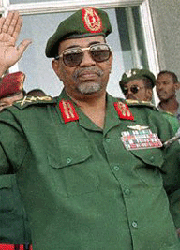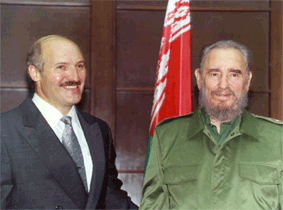 Name: Nicolae Ceauşescu
Name: Nicolae Ceauşescu
Born: January 26, 1918 in Scorniceşti, Romania
Died: December 25, 1989 in Târgovişte, Romania
Length of rule: July 11, 1965 - December 25, 1989 (33.5 years)
Means of ascent to power: leading Romania's communist party
Means of removal from power: overthrown in a coup d'état and executed
Style: Police state, cult of personality, Stalinist quasi-monarchy
NOTES:
On Christmas Day in 1989, the entire world was given a gift. After being overthrown in a coup d'etat, Nicolae and wife Elena Ceauşescu were convicted on the charge of genocide by a revolutionary kangaroo court, led down to a dingy basement, and shot to death by an army officer wielding a submachine gun. Normally, the civilized world frowns on coups, kangaroo courts and capital punishment, but in this case, the world kept quiet.
For over 30 years, Nicolae Ceauşescu and his wife Elena turned the Warsaw Pact nation of Romania into a laboratory for fear, misery and poverty. Assuming power in 1965 after the death of his predecessor, Ceauşescu quickly consolidated power by neutralizing his political rivals in the Romanian Communist Party, and by reorganizing the structure of Romania's dreaded secret police organization (the infamous Securitate) into a tool capable of completely repressing public political expression and dissent. He was just warming up.
Following a visit to fellow dictator Kim il-Sung in 1971, Ceauşescu apparently realized that he had been something of a piker as a dictator when compared to the godlike Kim. Taking cues from North Korea, Ceauşescu embarked on the creation of a "his and hers" dictatorship by means of a personality cult devoted to himself and his wife Elena, while also embarking on a disastrous policy of economic collectivization that transformed an already economically fragile nation into a poorhouse.
Apparently feeling that there were too few Romanians to lord over, Ceauşescu banned both contraception and abortion, leading an explosion of children that could not be fed, housed, nor cared for. This population explosion led to an increase in Romania's foreign debt, which Ceauşescu unwisely helped deal with by exporting Romania's already insufficient grain harvest, thus creating poverty and food shortages extreme even by the standards of a Communist country. With the exception of Enver Hoxha's isolationist dictatorship in Albania, the Ceauşescus excercised a personal control of a nation unknown in Europe since the death of Josef Stalin.
By the late 1980's, the entire Warsaw Pact began to collapse around Ceauşescu's ears. Without international support, nobody was willing to spend any amount of time, money or manpower to prop up Ceauşescu's decrepit autocracy, and in 1989, the end finally came.
After rising economic discontent led to an unprecedented public demonstration and uprising in the city of Timişoara, Ceauşescu ordered the Securitate and Romanian army to brutally disperse the crowds and punish the leaders of the demonstration.
After returning from a state visit to Iran, Nicolae and Elena Ceauşescu were horrified to find that the demonstrations had spread to Bucharest, and that during their two day absence, the leadership of the Securitate and Romanian army wisely decided to shift their loyalties from the despised Ceauşescus and launched a coup d'etat. The Ceauşescus never had a chance.
The dictator and his wife attempted to flee by helicopter, but were grounded by orders of the new anti-Ceauşescu military. Attempting to flee by car, they were stopped by civilian police in Târgovişte. The police detained the "mother and father of Romania" in the back seat while listening to the radio to determine if the anti-Ceauşescu coup would succeed. It did.
On Christmas Day in 1989, it was all over, and pictures of Nicolae and Elena Ceauşescu's bullet ridden bodies were sent to foreign press outlets over the world, without so much as a peep of protest. It seems that the entire world had finally had enough of the loathesome Romanian strongman and his insufferable wife.
What set Ceauşescu apart from some of his contemporaries was the enormous lingering damage done to Romania's social and economic fabric. While other Eastern European nations have recovered from the damage done by Communism, Romania's enforced population boom created millions of orphaned children, many of whom were infected with HIV by Romania's miserable public health system. To this day, Romania lags behind her former Warsaw Pact allies in Poland, Hungary and elsewhere in every measureably standard of economic and social progress, and all because of the megalomania of Nicolae and Elena Ceauşescu.
 Well, someone's still got to believe in the struggle of the proletariat, right? The Marxists Internet Archive is a virtual treasure trove relating to the 20th century's deadliest joke. In addition to Das Kapital and The Communist Manifesto, marxists.org provides a treasure trove for dictator fans. I nearly blew my top reading about Enver Hoxha's meetings with Josef Stalin!
Well, someone's still got to believe in the struggle of the proletariat, right? The Marxists Internet Archive is a virtual treasure trove relating to the 20th century's deadliest joke. In addition to Das Kapital and The Communist Manifesto, marxists.org provides a treasure trove for dictator fans. I nearly blew my top reading about Enver Hoxha's meetings with Josef Stalin!